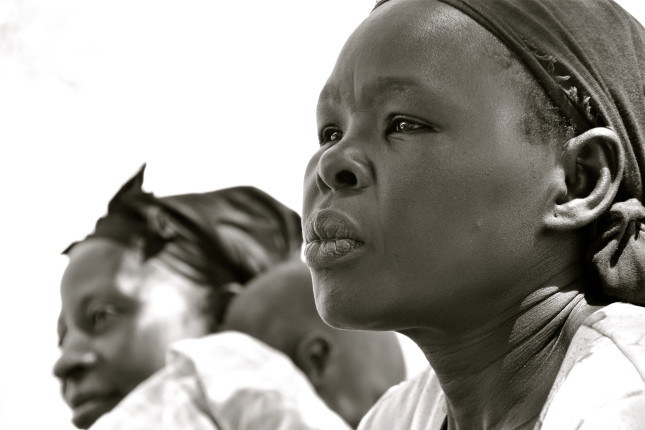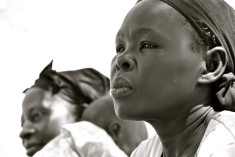-
Multiple Stressors Shape Mothers’ Mental Health in Nairobi, Kenya
March 11, 2020 By Sangeetha Madhavan The mental health of mothers cannot be studied in isolation, as just a psychological snapshot in time. Their complex lives both past and present must be taken into consideration. When I was researching marriage, motherhood, and social support in Korogocho, an informal settlement in Nairobi, stories I heard underscored how a range of life experiences conspire to affect a woman’s mental health. I heard life histories like this:
The mental health of mothers cannot be studied in isolation, as just a psychological snapshot in time. Their complex lives both past and present must be taken into consideration. When I was researching marriage, motherhood, and social support in Korogocho, an informal settlement in Nairobi, stories I heard underscored how a range of life experiences conspire to affect a woman’s mental health. I heard life histories like this:When Ann was 17, she met Fredrick, got pregnant and moved in with him when she was 18. Two years later, Fredrick got arrested and was gone for two years. When he came back, she got pregnant with child No. 2 within a month but then left the relationship seven months later because of ongoing conflict. When she was about 23 with a 2-month-old and 5-year-old, Frederick shot her. Two months later, he himself was killed. Four months later, she met the man who would become her second husband. After living together for three years, he took her back to his home to meet his family. She then had her third baby.

The mental health of mothers cannot be studied in isolation, as just a psychological snapshot in time. Their complex lives both past and present must be taken into consideration. When I was researching marriage, motherhood, and social support in Korogocho, an informal settlement in Nairobi, stories I heard underscored how a range of life experiences conspire to affect a woman’s mental health. I heard life histories like this:
When Ann was 17, she met Fredrick, got pregnant and moved in with him when she was 18. Two years later, Fredrick got arrested and was gone for two years. When he came back, she got pregnant with child No. 2 within a month but then left the relationship seven months later because of ongoing conflict. When she was about 23 with a 2-month-old and 5-year-old, Frederick shot her. Two months later, he himself was killed. Four months later, she met the man who would become her second husband. After living together for three years, he took her back to his home to meet his family. She then had her third baby.
It does not take much to imagine the toll that unstable relationships and motherhood in the context of poverty take on women’s mental and emotional health. When an unintended pregnancy triggers a hasty cohabiting arrangement with an economically unstable and violent partner, it sets up the perfect storm for depression and post-traumatic stress syndrome with long lasting ripple effects.
The only recourse that Ann had for support was her family. But her ties to kin may likely have weakened, because she did not consult them when beginning her relationship with Fredrick. Taken together, this series of unfortunate events underscores the importance of life course in understanding the cumulative effects of multiple stressors on emotional and mental well-being.
Rising Rates of Depression
A recent study conducted in Nairobi slums uncovered a prevalence rate for postpartum depression of 18 percent likely compounded by gender-based violence which hovers around 47 percent for women in Kenya. In other parts of Africa, general depression is becoming more common, particularly among women, because of increasing economic insecurity, the breakdown of traditional family structures, and unstable unions. Poor mental health slows the continent’s productivity. According to the World Health Organization, the number of years lost to disability as a result of mental health and substance use disorders increased by 52 percent on the continent between 2000 and 2015.
Clearly the time has come to pay attention to mental health. We must expand the scope of research beyond the individual and take a multidimensional approach to understanding what’s behind women’s poor mental health. And it must consider women’s roles as mothers and partners as part of the equation. Otherwise, people like Ann will fall through the cracks.
Role of Relationships
Are marriage and relationships, more generally, good for mental health? How does motherhood with or without marriage affect mental health? In the United States, marriage is something that protects mental health as is cohabitation. Other research from the UK, however, suggests that disadvantaged women are likely to benefit more from marriage than cohabitation because of the legal protections that marriage confers. And how motherhood affects a woman’s mental health depends on the quality of the relationship with the partner.
While research in the West sheds some light on the effects of marriage, relationships, and motherhood on a woman’s mental health, we know next to nothing about the African context where the “process” of marriage has become increasingly protracted because of economic precarity and unstable kinship support. Major shifts in the very definition of marriage are underway. As Ann’s case clearly shows, the work required to stabilize informal unions—commonly referred to as “come we stay”—and care for a child amidst economic and social uncertainty is likely to significantly affect a woman’s mental health.
The Hard Work of Stabilizing a Union
In ongoing work with colleagues, we draw on life histories to show that the process of stabilizing a union is, in fact, more consequential than arriving at some celebrated end point, such as a civil ceremony that cements or formalizes a union—particularly when children are involved. The hard work of establishing trust with a partner, gaining respect from kin, and securing financial support can be quite stressful. But the work is essential to protecting mental health. Without coming out into the light and being accepted by family, building a relationship with the other family, and securing financial support, a woman will be left isolated and insecure, a recipe for poor mental well-being.
In recent work, we found high levels of self-reported stress among single mothers in Korogocho accompanied by high levels of emotional support but very low levels of financial support. Moreover, while the bulk of emotional support comes from other women, as might be expected, those women who enjoy high levels of emotional support from men report lower stress. This suggests that relationships with men can be protective under certain circumstances. But we have a lot more to learn.
One way to move forward in studying mental health and developing effective interventions is to adopt a life course approach. This framework explicitly integrates time into understanding the cumulative effects of relationship changes, family dynamics, financial pressures, educational and employment aspirations, and the pressures of motherhood itself. Moreover, situating mental health within life course transitions facilitates timely and targeted interventions to support women, men, and children. We owe it to women like Ann to prioritize mental health in addressing the “M” in maternal and child health.
Sangeetha Madhavan is a Professor of African American Studies and Sociology and the Associate Director of the Maryland Population Research Center at the University of Maryland.
Sources: Archives of Women’s Mental Health, Gender & Society, ICF International, Journal of Family Issues, Journal of Health and Social Behavior, Journal of Marriage and Family, Journal of Pregnancy and Child Health, “The Case for Marriage,” by Linda Waite and Maggie Gallagher, World Health Organization.
Photo credit: Black and white portraits Kenya, courtesy of Flickr user ciliaschubert
 A Publication of the Stimson Center.
A Publication of the Stimson Center.

 The mental health of mothers cannot be studied in isolation, as just a psychological snapshot in time. Their complex lives both past and present must be taken into consideration. When I was researching marriage, motherhood, and social support in Korogocho, an informal settlement in Nairobi, stories I heard underscored how a range of life experiences conspire to affect a woman’s mental health. I heard life histories like this:
The mental health of mothers cannot be studied in isolation, as just a psychological snapshot in time. Their complex lives both past and present must be taken into consideration. When I was researching marriage, motherhood, and social support in Korogocho, an informal settlement in Nairobi, stories I heard underscored how a range of life experiences conspire to affect a woman’s mental health. I heard life histories like this:

